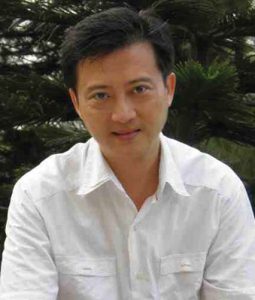Neuroticism is characterized by a sense of hopelessness, guilt, anxiety and poor adaptation to stress. In almost all studies, low neuroticism is a consistent factor among centenarians and this trait may have contributed to longevity due to less damage to the cardiovascular system of the body.

Sebastian Liew ND, MNHAA,
MHS (University of New England)
Medical Herbalist, Doctor of Naturopathy
Therefore how we manage stress plays a significant role in wellness and even longevity. We have the power within to change:
According to traditional European medicine, all stress related disorders such as anxiety, depression to black bile. Black bile as we understood from traditional Western herbal medicine is melancholy – the emotion associated with ‘stuck in one’s thoughts’ and cannot imagine a way out of a dead end situation in life. It is a form of stagnation, to use the herbalist’s language. To neutralise black bile, herbs, diet, spiritual practices and the importance of a healthy environment are employed. Many of the herbs used to neutralise black bile also have significant impact on our nerves, thus pointing a close relationship between the gut and the brain. Therefore if our bowel don’t ‘move’, there is stagnation, not enough oxygen get into the cells.
Imagine going to a town that is perceived to be unsafe or a haunted house and notice how your stomach feels?
In traditional European medicine such as Hildegard medicine, it seems that many known digestive herbs are also implicated as having influence on neurological conditions.
For examples:
In whatever way it is eaten (fennel), it makes a person happy, and brings to him a gentle heat and good perspiration, and makes his digestion good’ Physica
Now modern science and preliminary studies are telling a similar story.
It is now well established that stress symptoms such as anxiety and depression occurs frequently in up to 50 to 90% of all patients with a functional gastrointestinal disorder such as irritable bowel syndrome.
We know very well the effect of antibiotics on gut flora. Antibiotics have anecdotally been reported to induce acute psychosis that resolved after withdrawal of the drug.
In other words, imbalances in gut flora can influence our mood and emotional resilience and conversely, uncontrolled stress decreases diversity of gut flora. To reduce stress, we need both psychological/spiritual works and lifestyle changes such as diet. The best way to enhance good bacteria is not more probiotic supplement or yogurt but a diet of spelt.
There is a connection between the gut (digestive) and the brain. For example the drop in serotonin during the cycle increases the severity of symptoms such as bloating. Impaired digestion of foods (especially protein) may lead to poor availability ofamino acids such as tyrosine, phenylalanine and tryptophan.
Therefore, severe and chronic emotional stress is often one of the major causes of digestive disorders and can lead eventually to immune disorders. The converse is also true: impaired digestion can lead to emotional disorders and immune disorders. This is called the gut-brain axis.
In other words, the heart/brain talks to the gut and the gut talks to the brain.
Whenever I see someone or patient with any emotional stress issues, I always put him or her on my gut program and at the same time evaluate the source of the stress via holistic evaluation and counselling.
Whenever I do that, he/she will report that most if not all symptoms of destructive emotions, such as irritability or anxiety, are fading away.
In my book Leaf to Life: Unlock nature’s secrets to true health, I listed the 7 Sacred Letters as the key factors in wellness. The 7 Letters are H, E, A, L, E, R, S.

I would to use the 7 Letters to create a stress management protocol:
H for Herbs
Herbs here mean medicinal plant foods. Various fruits and vegetables containing non-digestible functional oligosaccharides (FOS) act as prebiotic compounds. Fennel bulb, a vegetable or herb is one such food found to have a medium to high level of FOS (Malinovska, Kuzmanova and Winkelha (2011). You can drink fennel tea daily to improve digestion and reduce stress hormones.
E for Environment
The health of our human body is connected to the health of nature.
In this age of terrorism and violence, we cannot achieve peace by more hate, more negative attitudes towards those who are different from us. Rather we need to learn how to generate energy of compassion and love. And this we need to start from our thoughts before we can be fruitful in our loving deeds. Love will transform all. Learn how to bless your boss, friends, peers, parents and everyone around you, whether you like them or not. You shall see lots of blessings in your life.
A for Assimilation
Digestion is important for clarity of mind. For example digestion of proteins is necessary for production of amino acids which are precursors for many of our neurotransmitters such as serotonin and dopamine.
To improve assimilation further, adopt some general rules for good digestion:
- Firstly relax the stomach first thing in the morning with warm water
- Add herbs to your meals. Consult a herbalist for a holistic protocol.
- Avoid eating concentrated protein such as meat together with too much starch (rice, flour, potatoes etc.) food.
- Avoid eating high fat or deep fried food with concentrated protein.
- Avoid eating dairy and concentrated protein together.
- Avoid drinking water during and right after meal. Wine, digestive herbs are alright to be taken with meal.
- Eats fruits as a separate meal.
- Minimize sugar in your diet.
- Do not work (including using the cell phone) while eating.
- Avoid talking when you eat.
L for Love
In an interview with the late Teresa Hsu, Singapore’s famed centenarian, she was asked about the secret to her long and healthy life. Part of her answer was: “a peaceful mind and a loving heart, and love all – good and bad people”.
Absence of love is constriction and stagnation. Stagnation is manifested in poor circulation, stubbornness, depression, and sluggish organ functions.
E for Exercise
Back in the days of our fathers and grandfathers’ generations, people moved and sweated more than modern city dwellers. They probably needed to walk to their workplace, and work for most people (except for the rich minority) was probably physical in nature: agriculture, physical labour, and construction. Even those who worked in offices and shops either walked or cycled to work. Back then, there was no air conditioning. Every day was a detoxification day – through sweating!
So what do you think is the best exercise?
One of the most basic exercises is just take a walk for 30 minutes after dinner instead of sitting in front of the TV. This has been shown scientifically to balance blood sugar, promotes good digestion and thus mood.
R for Ritual
Ritual means establishing a healthy balance and regularity of life or a list of habits that creates harmony.
A life of ‘doing’ and no ‘being’ create chaos in one’s life.
There are many examples of healthy habits than strive to balance between ‘doing’ and ‘being’. I listed in my book. One example is napping after lunch.
I learnt of a very good practice in a Japanese firm. During the lunch hour, supervisors and managers switch off the office lights to allow the employees to nap for an hour or so. As a result of
this practice, all the employees have become happier and more productive than before.
S for Spirituality
Spirituality defines the centre of our lives. Our centre or god can be money, fame, family, or children. It’s your choice. The centre will determine your relationships with yourself, others, and nature, as well as your approach to life situations. If we set our centre of our lives right, then all our other goals in life — wealth, friends, family, and career — will fall into their rightful places. Our life will be rooted in harmony and health.
Therefore, work on this tonight and ask- who or what is the centre of my life?
Copyright © Sebastian Liew, 2016
About Sebastian Liew:
Dr Sebastian Liew is the first Singaporean medical herbalist and doctor of naturopathy accredited with the Naturopaths and Herbalists Association of Australia. He has over a decade clinical experiences in treating and preventing diseases with phytotherapy (Western herbal medicine). He is also the author of the book Leaf to Life: Unlock nature’s secrets to true health. Please visit http://slnaturopath.com or find us in face book http://facebook.com/slnaturopath. Email: sebastianliew@slnaturopath.com. He is also the co-founder of a herb based vegetarian restaurant Seeds Garden in Melaka (http://seedsgarden.com.my)


